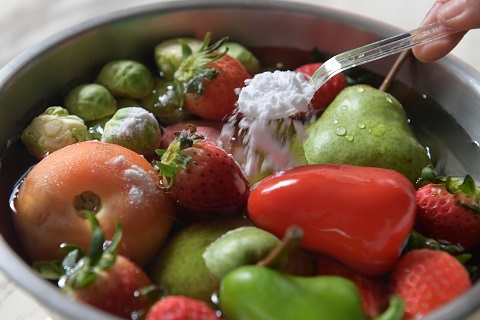Get rid of pesticides from fruits and vegetables by using THIS ingredient from your kitchen
Fri 27 Oct 2017, 19:19:22

Pesticides used in growing fruits and vegetables are highly dangerous, the toxic chemicals can cause a number of health issues from lowering your sperm count to putting young children at risk of developing cancer in later life.
However, there's now an easy way of getting rid of pesticides. New research revealed that baking powder removes up to 96 percent of pesticides from fruits and vegetables.
According to the study, when it is mixed with water and gently rubbed on apple skins it eliminated nearly all the residue left by two commonly-applied pesticides within just 15 minutes.
Lead author Dr Lili He from the University of Massachusetts, said: "Pesticide residues may remain on agricultural produce, where they contribute to the total dietary intake of pesticides. Concerns about potential hazards of pesticides to food safety and human health have increased, and therefore, it is desirable to reduce these residues."
The research mentioned that this method is more effective than the standard procedure of applying a type of bleach for two minutes to get rid of pesticides.
Baking powder can break down the pesticides due to its highly-alkaline pH and causes the chemicals to fragment into harmless molecules.
The researchers used common pesticides such thiabendazole and phosmet to organic red
apples which penetrate the apple skin. They left the fruit with the pesticides for a day and then they used one percent baking powder mixed with two cups of water to clean the apples.
apples which penetrate the apple skin. They left the fruit with the pesticides for a day and then they used one percent baking powder mixed with two cups of water to clean the apples.
With electronic mapping technology, they tried to assess the pesticide presence on the surface of, and inside, the apples. It was found that baking powder solution after 12 minutes of gentle scrubbing removed 80 percent of thiabendazole, while it took 15 minutes to remove 96 percent of phosmet.
However, according to the study, the effectiveness of the method diminished as the pesticides penetrated deeper into the fruit. It was not completely effective in removing residues that have penetrated into the apple peel.
Dr He said: "The use of pesticides in agriculture has led to an increase in farm productivity...However, pesticide residues may remain on agricultural produce, where they contribute to the total dietary intake of pesticides."
"Concerns about potential hazards of pesticides to food safety and human health have increased, and therefore, it is desirable to reduce these residues...The results showed that the baking powder solution was most effective in removing thiabendazole and phosmet on and in apples," Dr He added.
The findings were published in the Journal of Agricultural and Food Chemistry.
No Comments For This Post, Be first to write a Comment.
Most viewed from Health
AIMIM News
Latest Urdu News
Most Viewed
May 26, 2020
Do you think Canada-India relations will improve under New PM Mark Carney?
Latest Videos View All
Like Us
Home
About Us
Advertise With Us
All Polls
Epaper Archives
Privacy Policy
Contact Us
Download Etemaad App
© 2025 Etemaad Daily News, All Rights Reserved.






























